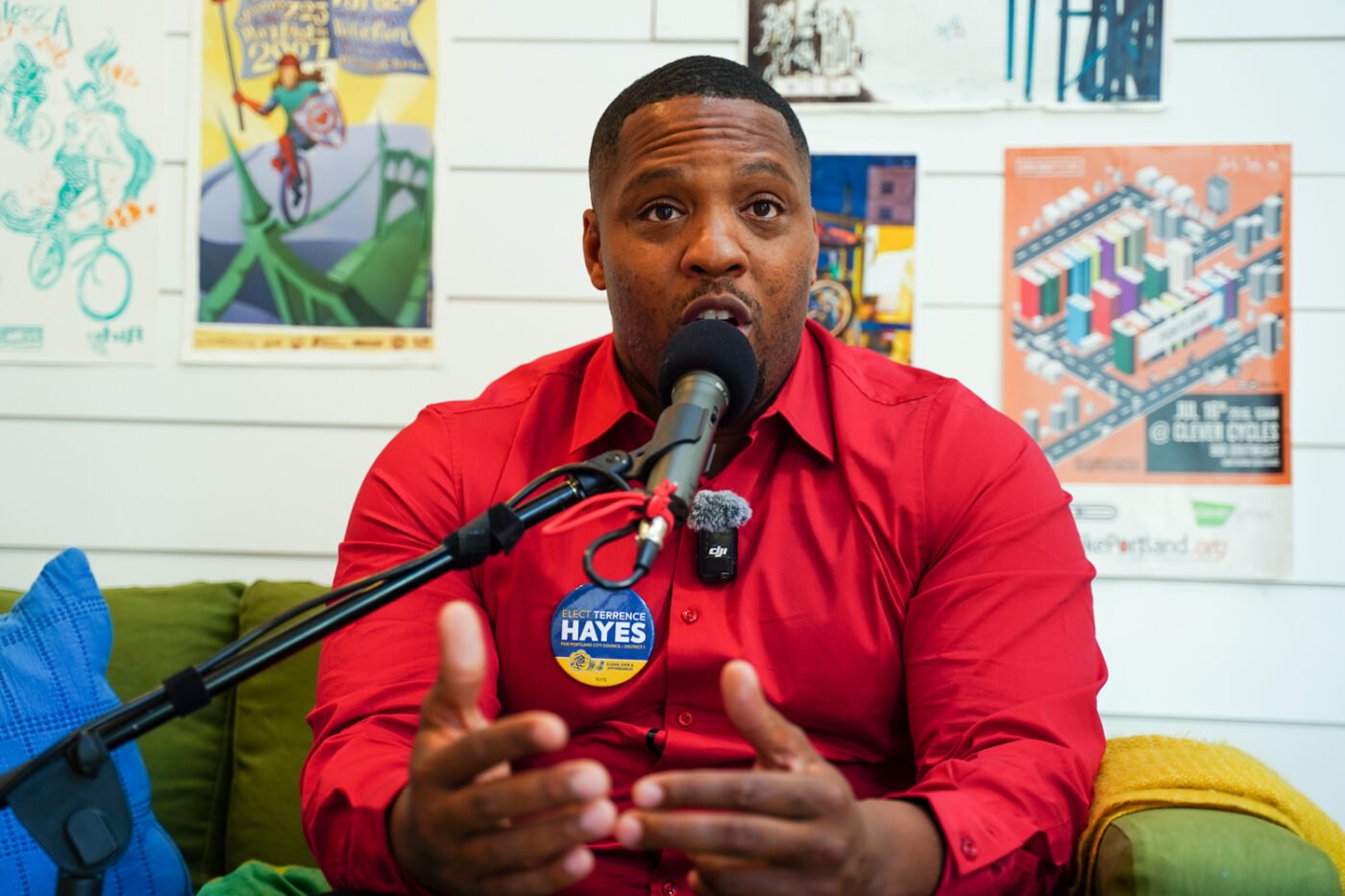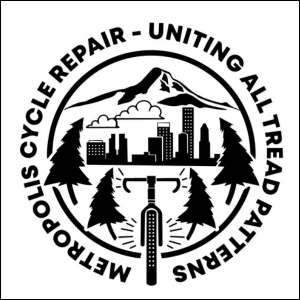Once I read City Council District 1 candidate Terrence Hayes’ recent fundraising email to supporters titled, “Portland’s War on Cars,” I knew I had to sit down and talk with him. In this interview, I share my concerns about the way he chose to frame our transportation challenges and Terrence explained why he wrote it. But that was just the start of an interesting conversation that included exchanges on everything from the future of 82nd Avenue (he supports a dedicated bus lane) to policing (he wants more boots on the ground), local politics (he says progressives in his race are flip-flopping on public safety), and more.
Among a field of nearly 100 candidates in the coming election, Hayes stands out. Not only is he the cousin of Quanice Hayes, the 17-year old who was murdered by a Portland Police Bureau officer in 2017; but Terrence served nearly 13 years in prison for shooting someone in the leg in 2003. Since then, Hayes has established a successful business and has become a community leader in gun violence prevention.
Given that past, it’s a bit surprising that he’s very proud to be endorsed by the Portland Police Association, the union that represents Portland Police Bureau officers. He also wants to add hundreds of new police officers to Portland streets as a key part of his public safety platform. That stance, and the endorsement of City Commissioner and mayoral candidate Rene Gonzalez, has put Hayes in an interesting political position in traditionally progressive Portland.

For a few highlights of the conversation, check out this video on Instagram or read a few key exchanges below…
About that “War on Cars” email:
“Well, you know, we always want to capture folks’ attention and anytime you say something like that, you’re going to capture attention… Remember, I’m always speaking from an east Portland point of view. When I’m talking to folks in east Portland, what they’re always complaining about is our lack of sidewalks, our lack of paved roads and safe roads. And they really feel that the biking and all that, got ahead of the other things in transportation that they would have liked to focus on because most of them commute to work, commute to schools, commute to the grocery stores — and a lot of them was long commutes.
I’m simply talking about prioritization. When our transportation is safe, our buses, when we have more bus routes, when we have more MAX routes, right? Especially from east Portland into the city — then we actually can create pathways for less cars and safer for bikers.
And so, no! I don’t want faster cars. I got kids, man! I don’t want people dying and getting hurt. But what I do want us to approach infrastructure in our roadways holistically. I’m using the words to challenge everybody.
So kick my tail and hold me accountable. But when you look out of a lens of east Portland, we’re still looking at the difference between the privilege of biking in relation to people that work from home, people that can afford, in whatever way, to not have to drive a car, drive their kids to school, drive for work, school and groceries. Right. So I’m looking through a particular lens. Bridge building don’t always mean you don’t say the tough things. It just means you’re present to hear everybody out. No one can never accuse me of not hearing you out.”
Do you support a dedicated transit lane or a high-priority transit lane on 82nd Ave?
“For sure. Again, I’m going to die on a hill that 82nd itself has always — and should always — look very vibrant and interconnected.”
Your 17-year-old cousin was murdered by a Portland Police officer, and now you’re not only endorsed by their union (PPA), but you also support putting more officers on the street?
“Yes because if the national data says that we’re behind on officers, the amount of officers you need to create a safe city, no matter my personal emotion towards the action of an officer, it doesn’t change the data. Now you have to understand that when we took this loss as a family, what we’ve always demanded was better training, better decision making and policy change. If you look at what happened with my family and what we said publicly, we never became an abolitionist family because of this trauma. We’ve decided police are not going nowhere. We’re not having that discussion with people. What we want to talk about is getting better versions of policing.”
What have you seen from the PPB that gives you hope?
“It’s because I have the same hope for them that I have in anybody that’s caused harm. That they can do better. And because I humanize people. Again, there’s not an example for me as a Black man that I can’t point to all segments of American culture where they’ve caused harm to Black folks, right? And so for me, I’m looking at PPA and I’m saying, ‘Y’all need somebody who’s going to be honest, be clear, and still have your best in mind. And I think I can be that person.
But let’s be clear about something: I love my community. I’m doing this for my community.
Black people didn’t want to ‘defund’. We wanted to define. I’m talking to people in the Black community and they’re saying, we never asked for this. We just want it to be treated well. So I actually bring that voice. I have not varied. I have not compromised. I have not become a different version of myself when I did my PPA endorsement.
I said ‘My cousin was killed by an officer and I never want to see a young black man down the barrel of a police officer.'”
When talking about policing, I’m seeing what are considered progressive candidates in your race, when asked, ‘Do you want more police or not?’ they don’t say, ‘No.’ I think that is a really interesting change from previous years…
“The folks in my district that are more progressive was definitely pushing for defunding and everything else during that time. So they can politically change up if they want to. But when you start looking at the track record, it’s political suicide. They’re pivoting because they don’t want to have to answer for those positions that they built their heels on two or three years ago. They are pivoting because we were wrong as a city and we made a lot of decisions as a city that has caused more harm. Instead of defining, we defunded.”
How are you different than Rene Gonzalez?
“I think my lived experience makes me different. What I like, and where me and Rene meet in the most healthy way to me, is public safety. Being willing to make the hard decisions about public safety, willing to consider that both public safety — in a sense of accountability and restorative justice — should be something that’s on the table at all times. But I’m different because my lived experience will always lean me towards the compromise more than a very hard stand on anything.
I do like Rene. I think he’s an organic leader. It doesn’t mean I’m going to agree with you on everything.
And I think in the extremity of politics in our city we’ve created an extremity: either we agree on everything or we agree on nothing. And I just don’t live in that world.”
Just before he voted in support of the Portland Clean Energy Fund, Rene Gonzalez said: “Deeply embedded in this ordinance is… permanent racial grievance. And as a frame of a public policy going forward, I question if that’s the way we should be defining issues.” Do you agree with that?
“No, I don’t. I don’t agree that it doesn’t always have a place. I certainly believe it has a place.”
On what’s next for Portland:
“Listen, we got the WNBA coming, right? Caitlin Clark, hate her or love her, she done brought something new to this space. We all talking about it. We talking about a baseball team in our city. Come on, man! As we bring finances back to our city, we won’t have to fight about bike lanes or sidewalks. We just have the money. We can tax folks, get the money, and we can do both/and right? I want to be a both/and candidate. I know I’m gonna’ get my butt kicked sometime when I say things, but if you listen to the heart of what I’m saying, I am a both/and candidate.”
— Listen to the full episode in the player above or wherever you get your podcasts. The video below features the same exchanges shared above.





